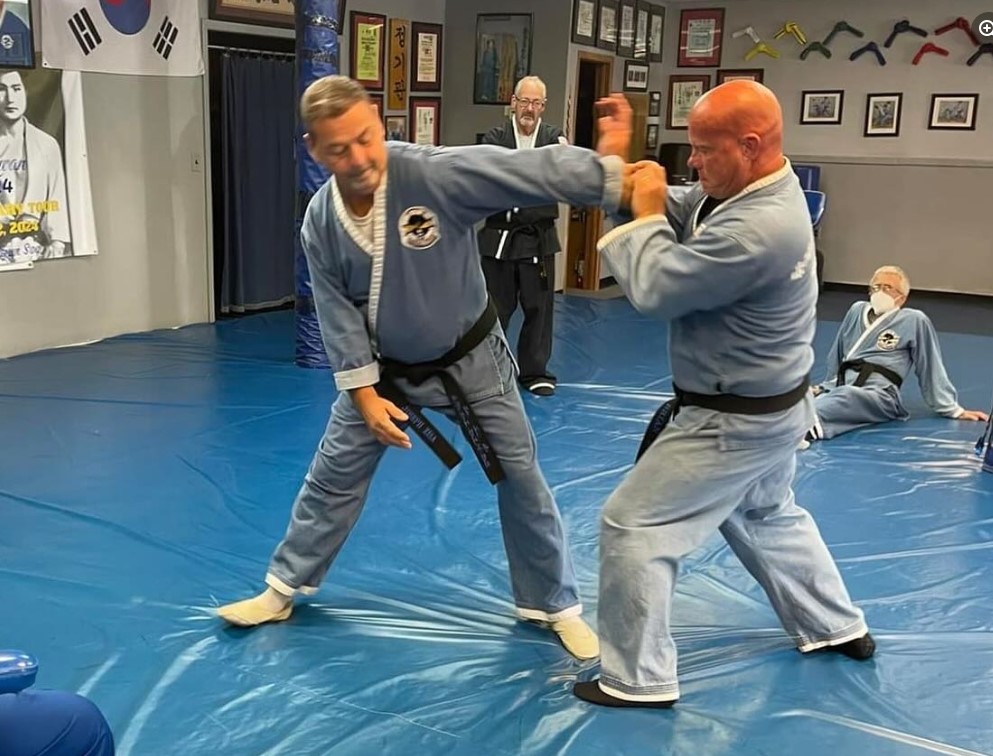Martial arts is a discipline that requires speed, agility, and precision. It is not just about strength and power, but also about quick reflexes and movements. If you’re practicing hapkido, karate, taekwondo, or any other type of martial art, the ability to move swiftly and with control is essential for success.
Increasing speed in martial arts takes time and requires a combination of training techniques, proper nutrition, and mental focus. Here are some effective ways to improve your speed in martial arts. As a beginner or an experienced practitioner looking to enhance your performance, these tips will help you take your skills to the next level.
Why is Speed Important in Martial Arts?
Speed is an important factor in martial arts, particularly in combat-oriented styles. As highlighted in recent research on young karate athletes, speed allows practitioners to execute techniques efficiently and effectively. In karate, all offensive and defensive actions must be performed with maximum speed and considerable force (Kavvoura et al., 2018). This rapid execution can be the difference between successfully blocking an attack or getting hit.
The importance of speed is evident in both kata (demonstration) and kumite (sparring) exercises. In kumite, speed enables fighters to surprise their opponents with swift strikes, making it difficult for them to defend. The research shows that improving speed abilities led to significant enhancements in technical qualities for both kata and kumite performances.
Speed helps in maintaining balance and fluidity in movements. In martial arts like karate, continuous motion is vital, and having good speed allows practitioners to flow smoothly from one technique to another without losing momentum. This is particularly important in kata demonstrations, where fluid execution of techniques is crucial.
Apart from physical benefits, speed also plays a significant role in the mental aspects of martial arts. Quick reflexes enhance self-defense capabilities and enable fighters to anticipate their opponent’s moves. The study found that improving speed qualities in young karate athletes led to better motor reaction times and increased frequency of hand movements, both of which are critical for anticipating and responding to attacks.
Developing speed in martial arts is especially important during the sensitive periods of growth. The research indicates that children aged 9-10 have the highest speed of visual-auditory motor reaction, making this age particularly favorable for developing and improving speed qualities (Kaya, 2016). By focusing on speed development at this age, martial artists can build a strong foundation for their future training and competition performance.
Focus Areas to Increase Speed in Martial Arts
Developing speed is important for martial artists of all ages, as it enhances both offensive and defensive capabilities. Research and expert advice suggest several key strategies for improving speed in martial arts:
Progressive Training Approach
Developing speed in martial arts requires a progressive training approach that builds a solid foundation before advancing to more intense techniques. Begin with basic conditioning exercises that focus on improving flexibility, strength, and agility. These fundamental elements prepare your body for the demands of faster movements.
Once you’ve established a strong base, progress to exercises that develop explosive power, which is needed for quick, forceful techniques. As your power increases, shift your attention to refining your skills, carefully examining each movement to eliminate any unnecessary actions that could slow you down.
With refined techniques and increased power, you can start gradually increasing your speed through skill loading. This process involves performing your techniques at incrementally faster paces, allowing your body to adapt to the increased demands.
Finally, aim for full-speed training where you can execute refined movements at maximum velocity. This progressive approach ensures that you develop speed safely and effectively, reducing the risk of injury while maximizing your martial arts performance.
Types of Speed to Develop in Martial Arts:
Perception Speed
This refers to how quickly you can assess and understand a situation. In martial arts, perception speed is crucial for anticipating your opponent’s moves and identifying openings. Improve this through regular sparring sessions, which expose you to various attack patterns and defensive strategies. As you gain experience, you’ll start to recognize subtle cues in your opponent’s body language and movement, allowing for faster decision-making.
Reaction Speed
Once you’ve perceived a situation, reaction speed determines how quickly you can respond. Enhance this by familiarizing yourself with potential scenarios through drills and situational training. Practice specific responses to common attacks, gradually reducing the time between recognition and action. Incorporate partner drills where your training partner initiates random attacks, forcing you to react swiftly and appropriately.
Execution Speed
This is the speed at which you perform your techniques. To improve execution speed, focus on perfecting your form first, then gradually increase the pace. Start from a ready and relaxed posture to eliminate wasted motion. Pay attention to details like proper body alignment, weight distribution, and economy of movement. Use targeted drills to isolate and speed up specific techniques, such as rapid-fire punching or quick kicks.
Recovery Speed
Often overlooked, recovery speed is vital for maintaining a strong defensive position and preparing for follow-up techniques. Practice returning to your starting stance or guard position quickly after executing a technique. This includes rechambing kicks, retracting punches, and regaining balance after throws or sweeps. Incorporate recovery movements into your regular training routines, emphasizing the importance of maintaining a defensive posture even after attacking.
Combination Speed
This involves linking multiple techniques together quickly and smoothly. Work on transitioning between different strikes, blocks, or movements with minimal pause. Practice common combinations repeatedly to develop muscle memory, allowing for faster execution in real situations.
Footwork Speed
Quick and efficient footwork is fundamental to all aspects of martial arts speed. Develop agile footwork through ladder drills, jump rope exercises, and specific martial arts footwork patterns. Focus on maintaining balance and readiness while moving swiftly in all directions.
By developing these various types of speed, martial artists can significantly enhance their overall performance, improving both offensive capabilities and defensive responsiveness.
Specific Training Techniques
Cardiovascular training for increasing speed in martial arts
Cardio enhances your endurance and stamina, allowing you to maintain quick movements over prolonged periods. Activities such as running, cycling, and swimming improve the efficiency of your heart and lungs, ensuring that your muscles receive an adequate supply of oxygen during high-intensity workouts.
Incorporating interval training into your routine, which involves alternating between high and low-intensity exercise, can significantly boost your cardiovascular fitness. This method helps to mimic the bursts of speed required in martial arts.
Incorporating exercises such as skipping rope can improve your footwork speed and coordination. Consistent cardiovascular training not only enhances your overall fitness but also reduces fatigue, enabling you to execute rapid techniques with more precision and control.
Strength Training
Stronger muscles allow for more explosive movements, and the ability to generate power quickly is essential for fast strikes and kicks.
Focus on compound exercises such as squats, deadlifts, and bench presses that engage multiple muscle groups at once. This type of training not only improves overall strength but also helps with balance, coordination, and body control.
Incorporating plyometric exercises into your strength training routine can also be highly beneficial for speed development. These explosive moves mimic the quick bursts of movement required in martial arts and improve your body’s ability to generate force rapidly.
Plyometric Exercises
Plyometric exercises are all about explosive movements that help to develop fast-twitch muscle fibers. These types of movements include jumps, hops, and bounds that require maximal effort in a short amount of time.
Some plyometric exercises that can improve speed in martial arts include:
- Box Jumps: Jumping onto and off a raised platform
- Medicine Ball Slams: Throwing a medicine ball down with force
- Jump Squats: Jumping from a squatting position as high as possible
Incorporating these exercises into your training routine can help you generate more power in your strikes and kicks, resulting in increased speed.
Agility Drills
Agility drills are vital for improving footwork speed, coordination, and reaction time – all essential components of speed in martial arts. These drills involve quick changes of direction, jumping, and balance exercises.
Some agility drills that you can incorporate into your training include:
- Ladder Drills: Hopping, skipping or jumping through a ladder pattern on the ground
- Cone Drills: Running around cones placed in various configurations at high speed
- Dot Drills: Jumping between dots arranged in different patterns
These drills challenge your body to move quickly and efficiently, improving your overall speed and coordination. They also help with balance and body control so you can execute techniques with precision and accuracy.
With these tips and techniques, you can improve your speed in martial arts and take your training to the next level. Remember, consistency and dedication are key to achieving optimal results. Keep pushing yourself, and you will see improvements in no time!
How Much Speed is Enough?
The amount of speed required in martial arts can vary depending on the style and level of proficiency. However, aiming for maximum speed should not be the ultimate goal. Instead, focus on developing proper technique and control while maintaining a fast pace.
Having good form ensures that your movements are efficient and effective, reducing wasted energy and increasing overall speed. It also helps to prevent injuries caused by improper techniques.
With consistent, mindful practice you can find a balance between speed and power. While being able to execute moves quickly is helpful, sacrificing power for speed can affect the impact of strikes and kicks.
The right amount of speed is when you can ultimately perform your techniques with precision, control, and power. It is a combination of speed, technique, and strength that makes for an effective martial artist.
Keep several key cautions in mind to ensure safe and effective training
Always prioritize mastering basic techniques before shifting your focus to speed. A solid foundation in proper form and execution is essential for preventing injuries and maximizing the benefits of speed training. Rushing into speed work without a strong grasp of fundamentals can lead to poor technique habits that are difficult to correct later.
Avoid using complex skills for speed training in the early stages of your development. Complex movements require a higher level of coordination and control, which can be compromised when attempting to perform them at high speeds prematurely. Instead, focus on increasing the speed of simpler, well-practiced techniques before progressing to more intricate ones.
Eensure that your muscles are well-conditioned before engaging in intensive speed work. Speed training places significant stress on your muscles, tendons, and joints. Without proper conditioning, you risk injuries such as strains, sprains, or more severe damage. Gradually build up your strength and endurance through consistent training, and always include proper warm-up and cool-down routines in your speed-focused sessions. By following these cautions, you can pursue speed development in martial arts safely and effectively, minimizing the risk of setbacks while maximizing your potential for improvement.
Why A Professional Instructor is Important
Having a professional and experienced instructor, like the ones you’ll find at Inner Power Martial Arts in Howell, New Jersey, provides valuable guidance, feedback, and personalized training plans to enhance your performance.
A good instructor will not only focus on improving your physical abilities but also help with mental aspects such as focus, discipline, and self-confidence. They can also teach you proper techniques, which are essential for optimizing speed while reducing the risk of injury.
An experienced instructor has a wealth of knowledge about various training methods and can tailor them to your individual needs. You won’t be wasting time on ineffective exercises but rather focusing on the areas that need improvement.
Having an instructor allows for accountability and motivation. Knowing that someone is expecting you to show up and give your best effort can push you to work harder and improve faster.
Come to Inner Power Martial Arts For Your Speed Training Needs
If you are looking to improve your speed in martial arts, look no further than Inner Power Martial Arts. Our experienced instructor, Master Brian McCann, offers age-specific classes for both kids and adults in Korean Hapkido and law enforcement defense tactics.
Our training programs are designed to help you grow and improve yourself every day. We focus on not just physical strength, but also mental aspects such as discipline, focus, and self-confidence.
Located in Howell, NJ, we serve Monmouth County and surrounding areas. Whether you are a beginner or an advanced practitioner, our classes can cater to your individual needs and goals.
Don’t waste time on ineffective training methods – trust the expertise of Inner Power Martial Arts for your speed training needs. Contact us today to learn more about our classes and schedule a visit. Let us help you become a faster, more efficient martial artist. Grow and improve with Inner Power Martial Arts!







